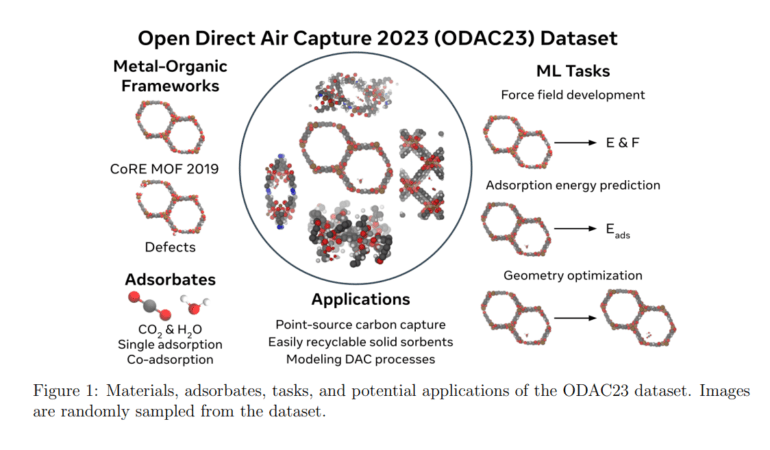TL;DR:
- Meta & GeorgiaTech’s collaboration aims to advance Direct Air Capture (DAC) research.
- DAC is vital in mitigating climate change by directly removing CO2 from the atmosphere.
- Metal-Organic Frameworks (MOFs) offer an energy-efficient solution for DAC sorbents.
- OpenDAC project seeks to reduce DAC costs by identifying novel, efficient sorbent materials.
- ODAC23 dataset comprises 38 million DFT calculations on 8,800 MOF materials for DAC research.
- The dataset is released to foster collaboration and facilitate machine learning model development.
Main AI News:
In the ongoing battle against the adverse effects of escalating carbon dioxide (CO2) levels on our planet’s climate, the global community is increasingly turning to innovative solutions. One such critical approach gaining prominence is Direct Air Capture (DAC). DAC, a process involving the direct extraction of CO2 from the atmosphere, holds immense potential in the crusade against climate change. Nevertheless, the widespread adoption of DAC has been impeded by its exorbitant costs.
A pivotal facet of DAC’s success hinges on the utilization of sorbent materials, and among the array of options available, Metal-Organic Frameworks (MOFs) have garnered significant attention. MOFs present a host of advantages, including modularity, flexibility, and tunability. Unlike conventional absorbent materials that demand copious energy for restoration, MOFs proffer an energy-efficient alternative, permitting regeneration at lower temperatures. This attribute positions MOFs as a promising and environmentally conscious choice for a multitude of applications.
However, the quest for suitable sorbents for DAC is a labyrinthine undertaking, primarily owing to the vast chemical landscape that needs exploration and the necessity to comprehend material behavior under varying humidity and temperature conditions. Humidity, in particular, poses a formidable challenge, exerting influence on adsorption and potentially leading to sorbent deterioration over time.
In response to this formidable challenge, the OpenDAC project has emerged as a synergistic research initiative, a collaborative effort jointly orchestrated by Fundamental AI Research (FAIR) at Meta and Georgia Tech. OpenDAC’s principal objective is to dramatically curtail the cost of DAC by unearthing innovative sorbents—materials adept at efficiently extracting CO2 from the atmosphere. The identification of such sorbents holds the key to rendering DAC economically viable and readily scalable.
Conducting exhaustive research, the team has given rise to the OpenDAC 2023 (ODAC23) dataset. ODAC23 represents a compendium of more than 38 million density functional theory (DFT) computations conducted on over 8,800 MOF materials, encompassing adsorbed CO2 and H2O. This dataset stands as the most extensive collection of MOF adsorption calculations at the DFT level, furnishing invaluable insights into the properties and structural dynamics of MOFs.
Furthermore, OpenDAC has extended the reach of the ODAC23 dataset to the wider research community and the burgeoning DAC sector. The intent is to encourage collaboration and lay down a foundational resource for the development of cutting-edge machine learning (ML) models. Researchers can now readily discern MOFs by approximating DFT-level calculations, thanks to state-of-the-art ML models honed on the ODAC23 dataset.
Conclusion:
The collaboration between Meta and GeorgiaTech, as exemplified by the OpenDAC project and the release of the ODAC23 dataset, signifies a significant step forward in the DAC research arena. The identification of efficient sorbent materials, like MOFs, has the potential to drive down DAC costs and make it a more economically viable and scalable solution. This development opens up opportunities for innovation and collaboration within the DAC market, paving the way for more sustainable and cost-effective climate change mitigation strategies.

